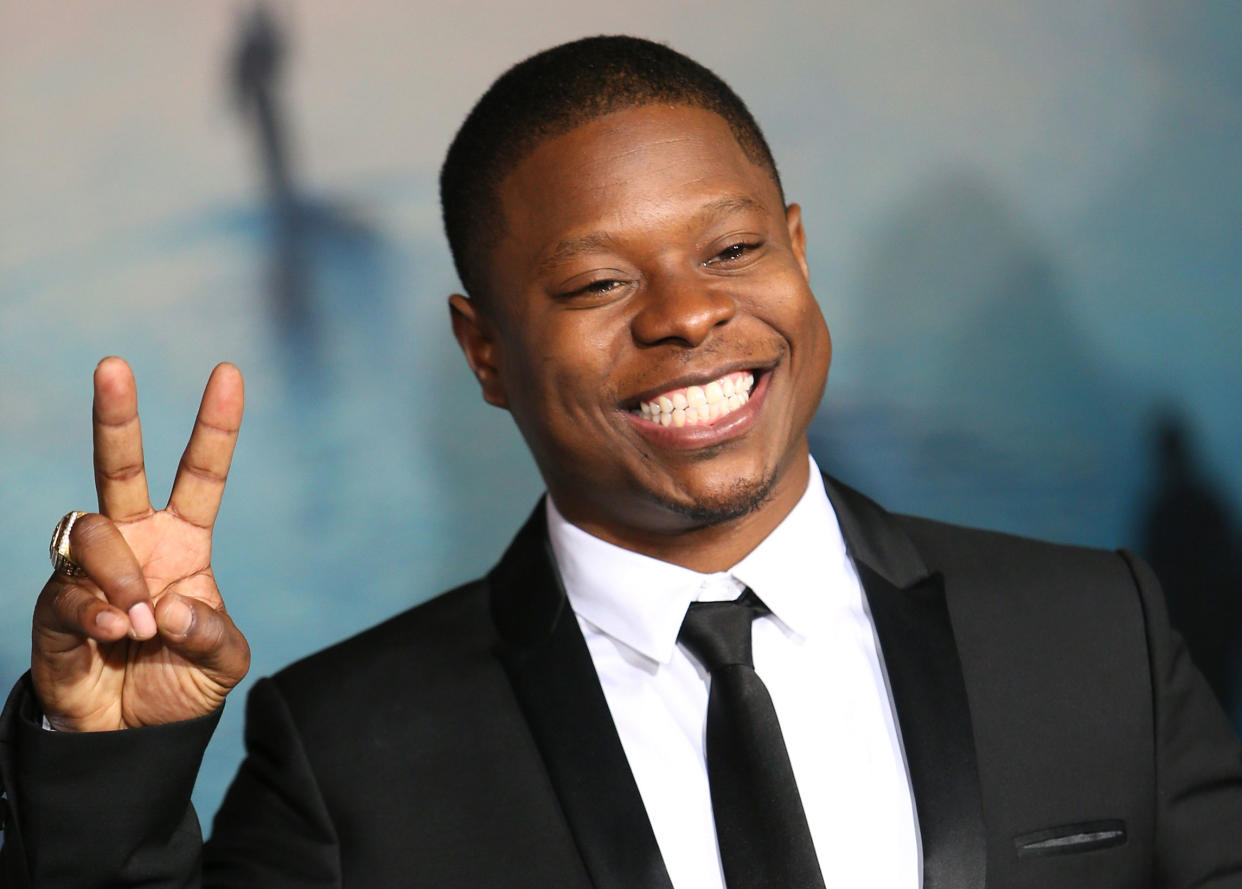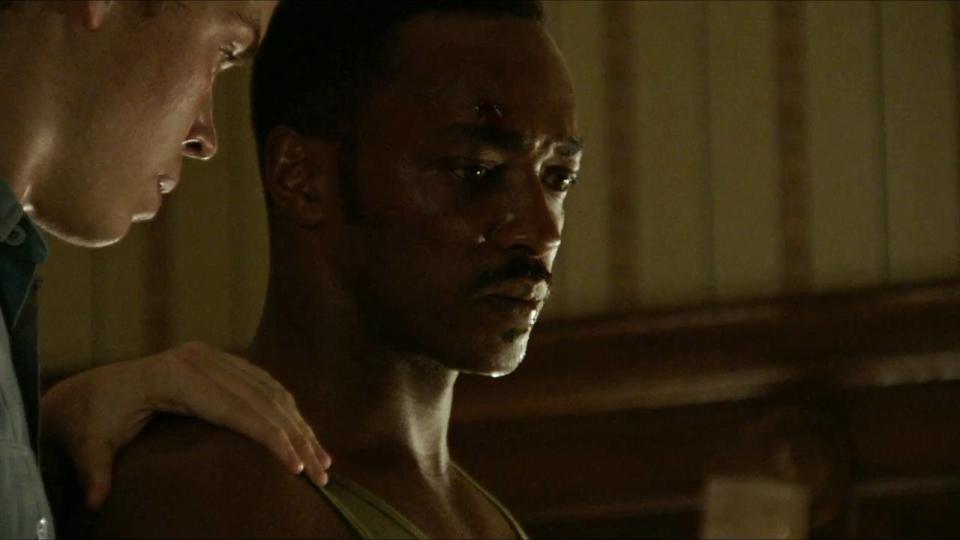Jason Mitchell on grueling 'Detroit' shoot: 'Everybody cried every day'

Jason Mitchell’s breakthrough role in Straight Outta Compton came with heavy doses of drama and heartbreak. He played ill-fated rapper Eazy-E, stricken by AIDS as his N.W.A. bandmates continued to see their careers explode.
But nothing could have prepared the 30-year-old New Orleans native for the experience of making Detroit, Kathryn Bigelow’s intensely unsettling drama about police brutality during the city’s 1967 race riots. Mitchell plays Carl Cooper, one of several young black men interrogated and beaten (or worse) over the long stretch of one hot summer night by a squad of white Detroit cops, led by the particularly savage Officer Phil Krauss (Will Poulter).
Over lunch at a bougie West Hollywood hotel, Mitchell defended his Oscar-winning director in the debate over whether white filmmakers should be telling stories like Detroit and recounted the emotionally grueling experience of shooting it.
Yahoo Movies: Congrats on Detroit. It broke me in half.
Jason Mitchell: I just really admire Kathryn Bigelow so much for making this just because … if it had been done by somebody of a lesser caliber I don’t know if it would’ve came out to be the same film.
When we talked about Kong: Skull Island you mentioned that that opportunity came directly as a result of your work in Straight Outta Compton. Would you say the same about Detroit?
Absolutely. Kathryn called me on my phone and was like, “Yo, I fell in love with the way you opened the movie.” She pitched me the entire role. … She didn’t go through my agent or my managers, anybody. She just called me directly.
So you never had to audition, she just straight up offered you the role?
Yep. I’m at home watching basketball and she just calls my phone and I’m sitting on the other end of the phone nodding like, “Lemme stop you, I’m just gonna go ahead and give you the ‘yes,’ OK?”
What did you know about her at the time?
I just knew she was an Oscar-winning director. I had seen her films, Zero Dark Thirty and Hurt Locker… But I didn’t know how she worked. She has a real unorthodox way of working, it’s pretty dope.
How so?
She creates this world for you to work in. Instead of [a traditional] camera setup, she creates this sort of world for you to just maneuver in and maneuvers the cameras around you. A lot of the stuff isn’t scripted or anything. … She didn’t even give everybody the entire script. So a lot of people didn’t even know what was gonna happen.
How much did you get?
I actually got the entire thing.

There has been a debate whether or not it’s right that a white filmmaker should tell this story. And even Kathryn admitted on The Daily Show that she had to do a lot of “soul-searching” first. What’s your opinion on that?
I think director-wise you could tell any story you want. But you have to humble yourself and say, “I don’t know this” or “I don’t know that.” Even when it came down to styling my hair, she felt like I knew better than she did … and that takes a lot. Even when it comes to dialogue and stuff like that, it really takes a lot for somebody to completely humble themselves and make that movie.
So she was coming to you guys for a lot of insight?
Well, she kind of just left it in our field. She left the ball in our court.
It’s such a brutal, raw, intense film. How do you prepare yourself mentally and emotionally for an experience like this?
I think more so it’s about us coming together [as a cast] and making unity amongst ourselves, so when we do have to go that far it’s not really that bad. We can go there and then we can pop out and pray with each other, we can hold each other, we can embrace each other, we can do all that. And unity makes these things happen. So just sort of building that relationship with the guys around me lets me go that far. All of us, for that matter.
How intense was this shoot on a day-to-day basis?
Oh man. Everybody cried every day … it was tough.
How did you comfort one another?
On set we would talk to each other and pray with each other and hold each other. But afterwards we would just do what regular guys do — well, guys and girls — just go get drinks, chill, and talk about our lives.
Did it get any easier as you went along?
No, not at all. For me it was just really tough to leave because I felt like this protective cloak over these younger guys that I was with. … I wrapped a lot earlier than anybody else and I [felt] like I was leaving them in that situation — just really made me feel bad.
Did you guys hang out with the actors who played the cops as well? Or was there separation?
At first Kathryn didn’t want, like, the police to hang with some of us. … But we had to make it a thing amongst ourselves that we would continue to lift each other up and not make it superweird for each other.
I assume she wanted you guys apart to build that tension.
Definitely. And not really having any form of contact. … She made it really clear that she thought it was best that we didn’t hang together. So that it had that natural tension. But after working a couple of days it was like man, we really can’t deal with this. We really gotta hang out, we really need better relationships.
Who led the way in bridging that gap?
I gotta say Will [Poulter]. Will was like, “I can’t do this. I hear what she’s saying and it makes perfect sense but, like, we’re already locked in and I’m not raised like that. … We have to build something.”

That’s ironic, considering he plays the most despicable character in the movie.
It was a real standup thing that he did. I don’t know too many guys his age that just have that type of confidence within themselves.
Were there ever moments of lightness on the set, where you cracked jokes to break that tension?
Definitely. The whole time, because I’m that guy. I’m the guy who can find humor in anything, so I definitely try to bring that energy. And I think that’s why Kathryn kept me around for awhile [after wrapping], too.
Detroit takes place in 1967 but it almost feels like its events set the tone for the lack of accountability in police departments since. How do you look at the relevance this story carries to what’s going on today?
Right. … And to have it be so relevant to today is kind of sad on our behalf, you know what I mean? We really have to learn and grow up because there’s no world in which we don’t co-exist. … What would life be like without police? But at the same time we have to take a stand and make the police point [at] themselves when there’s something wrong. They’ve become this huge gang that’s protected by this uniform and this badge … and a lot of these guys are afraid on a day-to-day basis, that’s why they kill people.
But [despite everything] we’ve gone through, people aren’t checking themselves. And that’s what this film does. It holds up a mirror and says, “Yo, are you doing the right thing? Because you know what’s right in your mind and your heart.” … I feel like we gotta continue to one-up each other and look at the glass half-full instead of just not trusting the police.
Have you had run-ins where feel like you’ve encountered racism from cops?
Just being profiled in general doesn’t feel good. New Orleans was at a point where if they felt like it was a situation they could pull you over and they would definitely gonna pull out a gun. Like you already know the drill, “Put your hands out the window, put your hands on the steering wheel.” They don’t even check your ID or your license anymore, they come straight and check your car, search your car, make you feel very inferior.
One of my good friends, [NFL player] Joe McKnight, was killed by a white guy, and it was over road rage. Like, you killed him in New Orleans, the city that he’s from because he doesn’t have the jersey on and you don’t know who he is, so he’s just some black guy? It was terrible. Absolutely terrible. … It happened in broad daylight in the middle of the street. They were both in their cars and both got out, and one of them ended up getting shot. And [the shooter] didn’t even go to jail that day, isn’t that crazy? It’s crazy.
Kathryn has said she wants Detroit to spark a conversation. What do you think is the power of a film like this?
I just think it’s informative because knowing is half of the battle. If we know what’s going on, then we can address it. Everybody should go home feeling how they truthfully feel about it. If you’re angry, you’re angry. If you’re like, “Oh, that was 50 years ago,” that’s 50 years ago. But if everybody is honest with themselves and those around them about where they’re at mentally, then we can move forward. If not, then we can’t.
Detroit is now in theaters.
Watch John Boyega talk about the emotional shoot:
Read more on Yahoo Movies:

